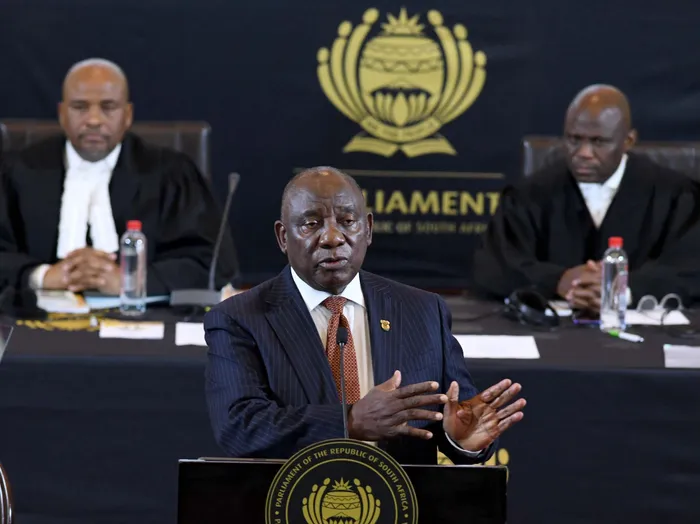GNU’s reality built on ‘alternative facts’

President Cyril Ramaphosa delivering the seventh Opening of Parliament Address in Cape Town. Picture: GCIS
The most recent data on municipal governance shows that out of 257 municipalities in South Africa, only 27 are rated stable.
Sixty-six are rated completely dysfunctional, with the balance teetering between high- and low-risk.
In his Opening of Parliament Address last week, the President repeated several unfulfilled promises contained in his previous State of the Nation Addresses. The seriousness with which he delivered them does not make those promises worthy of belief.
The late German-American political philosopher Hannah Arendt argues that in politics, “the distinction between truth and lies can be eroded, over time, by continual lying”. When political leaders continually lie, “even if they are neither intended to be believed nor are believed they begin dismantling the architecture of belief and truth itself”.
She further states that “the result of a consistent and total substitution of lies for factual truth is not that the lies will now be accepted as truth, and the truth be defamed as lies, but that the sense by which we take our bearings in the real world is being destroyed”.
Donald Trump’s previous Counsellor, in a press interview on January 22, 2017, made the now famous statement when confronted with a lie his spokesperson Sean Spicer told about the crowd size at Trump’s inauguration that “it’s not a lie, it’s alternative facts.”
For Arendt, “consistent lying, pulls the ground from under our feet and provides no other ground on which to stand”.
Roger Berkowitz says that “the lesson Arendt draws is that politics has vanquished facts. This loss of factual truths deprives the world of the shared and common pillars on which it should stand. The loss of truth, therefore, is the loss of our shared political reality.”
It is this reality that Cyril Ramaphosa and his government of national unity (GNU) do not understand. That an entire Cabinet Lekgotla, made up of diverse political parties, could sit there and endorse a speech littered with failed promises (which, by the way, they all vociferously criticised at previous Sonas) as the way forward for our country, tells us that the South African public is in for the greatest assault on our intellectual reasoning over the next five years.
The president’s youth employment initiative is a drug to keep the restless natives quiet. It’s not real employment. It’s a grant for three to six months with some work experience and then you are back in the unemployment line.
All the employment data indicates that youth unemployment has remained on an upward trajectory since 2015. Our public service institutions are bloated, of the costliest in the world and failing abysmally. Our civil servants earn some of the highest salaries in the world, relative to our global ranking.
Of our municipalities, only 27 are rated as stable. Four provinces do not have a single stable municipality.
Think for a moment what the people who live in those four provinces face daily. Contrary to the president’s oft-used phrase, we are not “making progress”, we are seeing the complete collapse of our municipal infrastructure. We live in an era of great deception, where politicians and their media collude to lie to their citizens. Violently foisting their alternative facts upon us, they destroy the clear line between truth and lies.
There is no national unity. There is an obvious national collusion to desperately perpetuate a narrative that dishes out alternative facts of all being well.
South African politics, whether it’s the GNU or the Progressive Caucus, are busy dismantling the architecture of belief and truth. We are taped together by alternative facts.
* Lorenzo A. Davids.
** The views expressed here are not necessarily those of Independent Media.
Do you have something on your mind; or want to comment on the big stories of the day? We would love to hear from you. Please send your letters to arglet@inl.co.za.
All letters to be considered for publication, must contain full names, addresses and contact details (not for publication)
Related Topics: